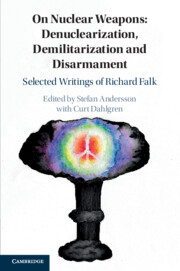 On Nuclear Weapons: Denuclearization, Demilitarization and Disarmament
On Nuclear Weapons: Denuclearization, Demilitarization and Disarmament Book contents
- On Nuclear Weapons: Essays by Richard Falk on Denuclearization, Demilitarization, and Disarmament
- On Nuclear Weapons: Essays by Richard Falk on Denuclearization, Demilitarization, and Disarmament
- Copyright page
- Dedication
- Epigraph
- Contents
- Foreword by Zia Mian
- Preface by Richard Falk
- Acknowledgments
- Part I International Law and World Order
- Part II Impacts of Democracy, Neutrality, and National Interest
- Part III Nuclear Policy Initiatives
- Contents
- 12 Arms Control, Foreign Policy, and Global Reform
- 13 The Illegitimacy of the Nonproliferation Regime
- 14 No First Use of Nuclear Weapons
- 15 Environmental Warfare and Ecocide
- Part IV Remembering the Past, Encountering the Future
- Index
14 - No First Use of Nuclear Weapons
Pros and Cons
from Part III - Nuclear Policy Initiatives
Published online by Cambridge University Press: 04 July 2019
- On Nuclear Weapons: Essays by Richard Falk on Denuclearization, Demilitarization, and Disarmament
- On Nuclear Weapons: Essays by Richard Falk on Denuclearization, Demilitarization, and Disarmament
- Copyright page
- Dedication
- Epigraph
- Contents
- Foreword by Zia Mian
- Preface by Richard Falk
- Acknowledgments
- Part I International Law and World Order
- Part II Impacts of Democracy, Neutrality, and National Interest
- Part III Nuclear Policy Initiatives
- Contents
- 12 Arms Control, Foreign Policy, and Global Reform
- 13 The Illegitimacy of the Nonproliferation Regime
- 14 No First Use of Nuclear Weapons
- 15 Environmental Warfare and Ecocide
- Part IV Remembering the Past, Encountering the Future
- Index
Summary
Proponents of a no-first-use proposal generally emphasize the distinctive dangers posed by the existence of nuclear weapons, the most serious of which is the possibility of their use in international conflict. An objective of a no-first-use proposal is to make less likely the introduction of nuclear weapons into armed conflict between states. In so doing, this policy seeks primarily to encourage the perception of these weapons as illegitimate instruments of conflict, and thus to promote a concept of defense planning that satisfies security interests without relying upon nuclear weapons, save in the instance when the enemy uses them first. Several of the bases for favoring a no-first-use proposal have been set forth with admirable clarity in Professor Tucker’s imaginative essay. I should like, however, to discuss some further considerations that, when added to those discussed by Tucker, account for my support of such a proposal either as a unilateral measure or as a negotiated international agreement with one or more foreign states.
A no-first-use policy is only a partial substitute for those more fundamental changes in the international environment that are now believed to be a necessary, although unattainable, adaptation to the existence of nuclear weapons, such as the development of a stable peace system requiring comprehensive disarmament and substantial world government.
- Type
- Chapter
- Information
- On Nuclear Weapons: Denuclearization, Demilitarization and DisarmamentSelected Writings of Richard Falk, pp. 254 - 263Publisher: Cambridge University PressPrint publication year: 2019
